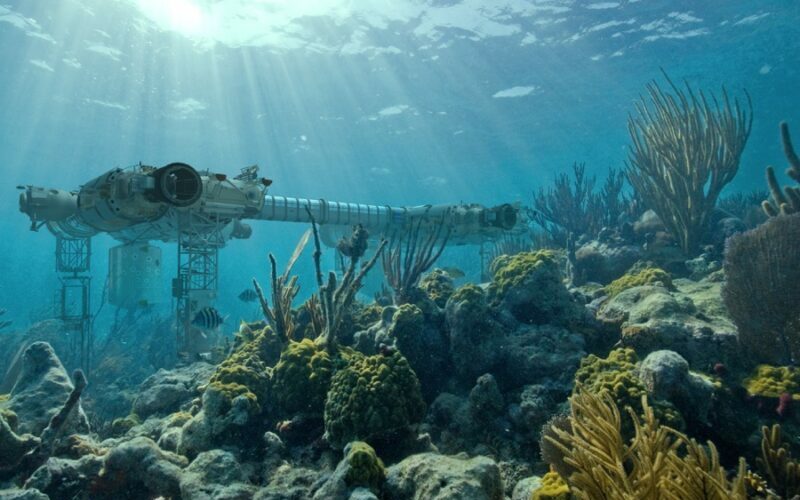A defecting CSIRO scientist has labelled the agency an “extravagant consulting company” due to its involvement in a controversial deep sea mining project. Suzanne Arnold reports.
CSIRO has become an “extravagant consulting company,” according to Professor David Karoly who cut ties with the agency in May last year.
Prof Karoly says scientists are barred from speaking publicly about government policy. Recent evidence suggests that CSIRO is being used by the government to blur controversial policy deliberations.
A CSIRO-led consortium has been commissioned to model and develop ecosystem-based environmental monitoring and management plans for a highly controversial deep sea-bed mining (DSM) project.
Scraping and digging up the seabed is an issue with profound implications for Australia nationally and internationally.
Even billionaire miner Andrew Forrest is calling for a moratorium on mining the seafloor.
Environment Minister Tanya Plibersek is sitting on the fence claiming she is “worried about the broad and unknown impacts,” but appears more concerned about creating problems with Pacific partners who are deeply split over the issue.
The President of Palau has described plans to mine the Pacific ocean bed as “insanity.” However Nauru, Kiribati, the Cook Islands and Tonga are supportive..
Calls for total ban
In a petition presented in March 2023 to the International Seabed Authority (ISA), over 1,000 signatories from 34 countries and 56 Indigenous groups called for a total ban on the DSM industry.
The UN International Seabed Authority (ISA) was established in 1994 to regulate and control all mineral-related activities in the international seabed, with a mandated duty to ensure effective protection of the marine environment from deep seabed mining.
ISA is expected to release regulations for deep sea mining in June 2023.
The CSIRO and the seabed
One of the first deep seabed operations in the Pacific will be the Canadian-based Metals Company’s proposed polymetallic nodule collection operation in the Clarion Clipperton Zone (CCZ) of the Pacific Ocean. The nodules, located four to six kilometres down, are rich in minerals.
According to the Metals Company website, the company
…contracts CSIRO-led consortium to pioneer ecosystem-based environmental monitoring and management plan for deep-sea nodule collection.
The CSIRO consortium will be paid $1.5 million for the work, which is expected to take 2 years.
Peer reviewed published research on deep seabed mining estimates seafloor research can cost up to US$80,000 a day.
The CSIRO claims the agency is “creating a blueprint for responsible, low-impact deep-sea mining.”
However, a further statement highlights the blueprint claim is well-nigh impossible given the funding, time frame and significant unknowns,
the ocean seabed is one of the most complex, under-studied and potentially vulnerable environments on earth.
CSIRO also claims that the research will “close a knowledge gap that there is today to help ISA make decisions.”
Dr Jeffrey Dambacher, a senior researcher with CSIRO‘s assessment team, goes further, stating that “we want to provide a framework to assess the potential environmental impacts of deep sea mining in a way that addresses the concerns of ISA, global stakeholders and the Metals Company.”
The known unknowns
Less than 10% of the deep seabed has been mapped thoroughly enough to understand even the basic features of the structure and content of the ocean floor, let alone the life and ecosystems, according to US scientists.
Between 70% to 90% of living things collected in the Clarion-Clipperton Zone have never been seen before. The impact deep sea mining would have on these species is entirely unknown.
No information is available on deep-sea species sensitivity and responses to noise. Without sunlight, many species rely on sound and vibrations, and the resilience of deep-sea habitats may also be affected.
Polymetallic nodules provide distinct habitat for species and critical importance for food web integrity. According to scientific research, nodules act as a driver of biodiversity, abundance and ecosystem function.
The regrowth of polymetallic nodules is estimated to take millions of years.
According to University of Hawaii oceanographer Jeff Drazen,
it’s one of the most biodiverse areas that we’ve ever sampled on the abyssal plains.
“Most of those microbes live on the very same nodules that miners are planning to extract. When you lift them off the seafloor, you’re removing a habitat that took 10 million years to grow.”
The zone is roughly the size of Europe,11,000 metres below sea level with mountains and valleys rich with the world’s largest deposit of polymetallic nodules.
The unknown knowns

Photo by Ganapathy Kumar on Unsplash
Deep seabed mining is globally controversial. The International Union for the Conservation of Nature (IUCN) details the major risks are seafloor disturbance, sediment plumes, and pollution.
The scraping of the seafloor using mining equipment can cause habitat alteration and fragmentation, leading to species loss and ecological function destruction or loss. The machines used for harvesting nodules can wipe out entire species.
Sediment plumes are identified as the greatest ecological threat deep-sea mining poses to marine life. It is not fully understood how far these plumes can disperse from the mined area, and to what extent they may influence species and the whole ecosystem, or injure filter-feeding species that depend on clean and clear waters to feed (for example, krill and some marine mammals).
Pollution-Vibration, noise, and light resulting from mining operations in the deep sea can harm species such as tuna, whales and sharks if these operations scale up. Additionally, these activities in the deep sea can lead to toxic products, fuel spills, and smothering of Benthic communities.
The World Bank report on deep seabed mining says the existing information about DSM impacts on the environment is poor. Acquiring information on deep seabed environments is costly and technically challenging.
The World Economic Forum (WEF) points out that around one million species reside in the ocean, with the majority still undiscovered in the deep sea. The WEF advises that the deep sea and its biodiversity, which play a key role in climate regulation and fisheries, could seriously and irreversibly harm marine ecosystems with long-lasting consequences for the health of the earth, warning that it may be given the green light in 2023.
Questions over CSIRO involvement
The engagement and involvement of the CSIRO led consortium in a new technology barely researched and banned by a growing number of countries raises significant questions.
An article in the Guardian cites CSIRO saying it has a “key role in the provision of scientific advice to support decision making so that decisions can be made on the best available scientific advice.”
In a statement last July, Science Minister Ed Husic said “CSIRO is Australia’s independent national science agency, governed by an independent board. Decisions on the research the organisation conducts, including individual research projects, are made at arms-length from government.”
The CSIRO board is appointed by the federal government. Governance arrangements require the agency to comply with legislation and government policy.
CSIRO needs to provide transparency of the decision processes in relation to the deep seabed project, given the extent of global opposition, and the unknowns involved. Budget details of $1.5 million need to be provided.
Sue Arnold is a former Fairfax investigative journalist. Her speciality is environmental issues and she is a regular contributor to Australian and international publications. Sue heads up Australians for Animals Inc., a 32-year-old wildlife charity and is Founder and CEO of the California Gray Whale Coalition based in San Francisco.

